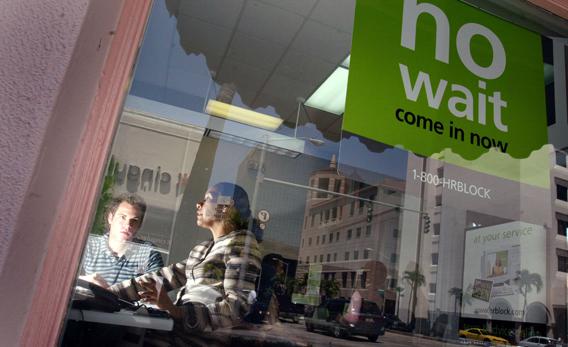Also see our Magnum Photos gallery on the joy of Tax Day.
Nobody likes taxes. People like money, and taxes are all about having less money. Even worse, when you give up money to a car dealer or a doctor or Amazon, you get something in exchange. But the government trundles onward no matter what you do—keeping cops on the street and drones in the air and sending out all those Social Security checks. Collectively, of course, taxes are absolutely necessary, but the extremely annoying process of actually filling out the forms and calculating the required sum is a completely unnecessary evil. Substantial tax reform is hard, but reforming the tax-payment process would be easy. The only thing standing in the way of 15-minute taxes is the insidious lobbying clout of the tax preparation industry—and unfortunately it’s getting worse even as technology should be making it better.
The dire trend goes back to a January 2010 initiative by the IRS to “regulate the tax preparation industry for the first time,” requiring tax prep companies to pay special fees and get special licenses.
Generally speaking, there are two kinds of federal regulation-making. There are the new rules that make incumbents squeal (like when the EPA told electrical utilities to stop poisoning children with mercury), and there are the new rules that make them clap. The IRS’s rules were of the latter kind. The three largest tax preparation chains—H&R Block, Jackson-Hewitt, and Liberty Tax—all applauded the new rule, as did the American Institute of CPAs. Not coincidentally, CPAs are exempted from the rule. They like it for the same reason the big companies like it: It puts potential competitors out of business. The fees and associated paperwork involved in the new regulations are small compared with the scale of major chains’ operation. But for the hundreds of thousands of small-scale entrepreneurs who do some tax prep work as a part-time, highly seasonal sideline source of income, this relatively small burden can loom large. IRS Commissioner Douglas Shulman even concedes that there’s no real problem with the vast majority of these practitioners, saying “It’s a small number of people that are unscrupulous, but those are people that we need to make sure we’re focused on.”
The libertarian Institute of Justice, which is managing litigation by small tax preparers against the new rule, argues it would make more sense to actually focus on the small number of bad actors rather than heavily regulate everyone. The IRS recently, and quite reasonably, implemented a system of mandatory Preparer Tax Identification Numbers that will allow the IRS to notice if any individual preparer is associated with an uncommonly large number of problems. That allows for a targeted remedy that won’t put the vast majority of nonproblematic tax preparers out of business. But, of course, a rule like that wouldn’t be as helpful to the major incumbents, who want the rules to be as burdensome as possible.
The even bigger policy question regarding tax-paying is: Why do you have to fill out all these complicated forms at all?
Why don’t you just lie on your taxes? You don’t lie because you’re worried that the IRS will catch you. And why do you worry about that? Because all the various entities who’ve paid you over the course of the past year have to submit paperwork about your income. Your employer, your bank, your stock broker, etc.—record and transmit almost all relevant information about your money to the IRS, meaning that if you lie you’ll get caught. But by the same token, the IRS could simply collect all this information and send you a tax bill. You could read it over, sign at the bottom, and either include a check or wait for your refund. It wouldn’t be fun, exactly, but it would sure be simple.
Needless to say, taxpayers should have the right to dispute the veracity of the IRS’s calculations and submit their own form. And some classes of people are going to routinely have unusually complicated tax finances. Journalists, for example, often have miscellaneous travel expenses related to freelance assignments. People running substantial small businesses will still need accountants. But for the vast majority of the population, most of the pain of tax compliance could be eliminated by a few keystrokes at IRS headquarters. So why don’t we do it? Two reasons. One is lobbying by the tax preparation industry to discourage states and the feds from developing easier tax-paying systems, as California recently did. The second is lobbying by anti-tax conservatives. When the Golden State implemented its ReadyReturn system, it did so over the objections of Grover Norquist and his anti-tax pressure group Americans for Tax Reform, which fears that if taxes become less annoying voters might be less unhappy about paying them. After all, if the government did something to make your life easier it would be harder to tout the difficulty of tax compliance as a reason to abolish the progressive rate structure.
From an ideologue’s perspective, it makes perfect sense. But for you, the next time you find yourself struggling with IRS forms, remember that it’s big business aligned with anti-tax conservatives, not the government, that are causing you the pain.
